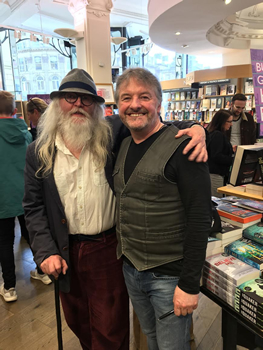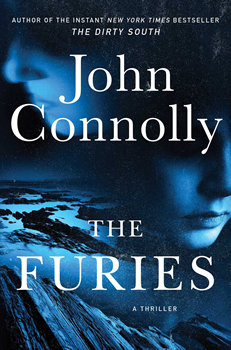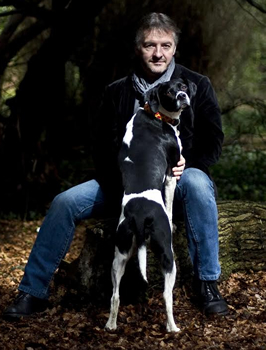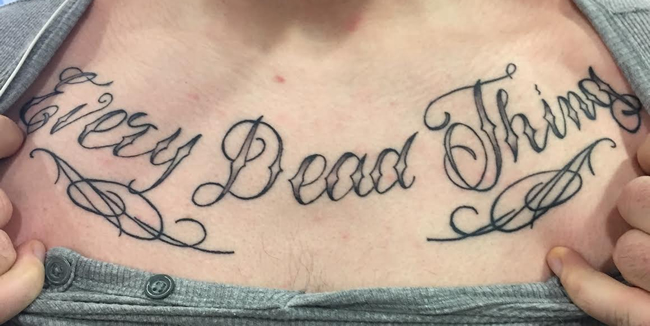

International Thrills: John Connolly
Two Parker Thrills for the Price of One
For those Charlie Parker fans perusing the pages of this month’s edition of The Big Thrill, we have an additional big thrill for you. With John Connolly’s latest release, THE FURIES, you get not one, but two Charlie Parker tales to delight your readerly senses.
In The Sisters Strange, an old foe returns to Portland, Maine. But in the years between his visits, Raum Buker has changed. Charlie Parker remembers a dishonest, malicious man, but this version of Buker is different: strange and hunted, drawing blood each time he claws at the newly tattooed pentagram on his arm.
None of this matters to Charlie, not until he’s hired by Will Quinn, a local lumberman, to look into Buker and what he wants with the Strange sisters. Unbeknownst to Charlie, Quinn had begun seeing one of Buker’s ex-girlfriends, Dolors Strange. With Buker’s return, Dolors has been on edge, afraid, both for herself and for her sister, Ambar, who hasn’t had the good sense to say no to Buker when he came calling.
It should have been a simple case. But a dark power is moving toward Maine in search of Raum Buker and leaving a trail of bodies in its wake. When it reaches Portland, who will survive, and who will be left a corpse?
In THE FURIES, we’re taken back to the first weeks of the pandemic. Parker watches the news, knowing his investigation business is going to take a hit and thinking it might be better to hole up in Vermont, closer to his ex-wife and daughter. But before he can begin packing, his phone rings with a case he can’t turn down.
Sarah Abelli is a grieving mother, her five-year-old daughter, Kara, having died in a tragic accident. Unfortunately for Sarah, her daughter’s death was only the beginning of her troubles. Her mobster husband, who had been embezzling from and snitching on his employers, was murdered by said employers for said activities. Murder wasn’t enough for the mob—they wanted their stolen money back. After a rough shakedown, Sarah gave them what cash she could find, changed her name, and moved to Maine, hoping she had left it all behind.
Maybe she would have succeeded, but two of the men involved in her attack, Gilman Veale and Lyle Pantuff, were convinced she had more money. And they decided to get it by stealing Sarah’s last mementos of her dead daughter and making Sarah pay for their return.
It might have worked, if those mementos hadn’t been haunted by her daughter’s ghost, a ghost who very much wants to return to her mother.
In this exclusive interview with The Big Thrill, Connolly discusses mystery fiction, language style, and the choices he’s made along the way.
I read that you chose to set the Charlie Parker series in America because you didn’t want to set a crime story in Ireland at that time. Could you speak more on that—on why you chose America rather than England? Why Maine instead of the more traditional Los Angeles?
I suppose that I very much didn’t want to be categorized as an Irish writer, or not according to the very limited definition that seemed to apply here (an Irish writer being someone concerned with the nature of Irishness, or, as one critic once put it, being engaged with the “Irish situation”). Also, because I wanted to write genre fiction of a very specific stripe—private-eye fiction—there were very few models in which to look in recent Irish literary history, our nation effectively having turned its back on much genre literature during the twentieth century. (I’ve produced a history-cum-anthology, Shadow Voices, about this, which comes out on the same day as THE FURIES in the US.)
That said, I don’t write like a North American, and the elements of the supernatural in my work, and my fascination with mythology and folklore, are very much products of my European/Irish upbringing, so I suppose one can never quite escape one’s heritage. Now I realize that it has helped make my writing a little distinctive, but it took me a while to come to terms with that.
As for Maine, I had worked there, and it was relatively unexplored territory in terms of mystery fiction, at least when I began writing. In addition, its landscape and its history were also less alien to me than that of other parts of the United States, so I felt reasonably comfortable using it as a landscape for the novels.
You ended up with two novellas, seemingly by chance, that feature women at the core of the novel. The Sisters Strange centers around two women who might be in distress… or maybe not, and THE FURIES has two concurrent plots, one a grieving mother being blackmailed, the other a woman trapped in an increasingly abusive relationship. Was this just a coincidence, or was something driving you deliberately in this woman-centered direction?
There was no element of chance about it: The book is constructed so that the two novels share themes, locations, and resonances. Part of it, oddly, may have come out of Shadow Voices, which was very concerned with restoring lost female voices to the history of genre literature, and I suspect some of that nonfiction work may have fed into my fiction as well. But then the science fiction novels I wrote with Jennifer Ridyard, my significant other, also placed women front and center, so I’d like to think that my awareness of some kind of balance in that regard isn’t necessarily a recent development.
In both stories, you frequently switch between first and third person. Was it difficult writing being directly in a character’s head and then zooming out to a more observational tone? Is there something you have to do to change gears, so to speak, or is it easy for you to move between the two views?

Connolly with one of his musical idols, Paddy McAloon of the band Prefab Sprout, who happened to be shopping in the Newcastle bookstore where Connolly was signing a few years ago
I’ve always played fairly fast and loose with first- and third-person narration. I think the reader is aware, on some level, of the compact between author and reader, and the reality of an overarching consciousness behind a novel. First-person narration alone can be very limiting, and I feel writers should use every tool available to them anyway. On the other hand, this is the first time that the novels have returned to first-person narration in some years, as the last eight have all been third-person narratives, in part because of something that happened back in The Wolf in Winter. Changing gears isn’t an issue, though, or certainly not by this stage. I think I know what I’m doing now, or I certainly hope so. Alternative opinions are, I’m sure, available.
As I was reading The Sisters Strange—my first foray into your work—I was struck with the density of language, with your word choice and tone. Instead of the staccato grit you’ll find with authors like Raymond Chandler, you had more of a multisyllabic fluidity. Was this a conscious decision, where you chose to actively lean away from the stereotypical short-and-fast noir style?
Funnily enough, my style has become a little less dense in recent years, so those two short novels are probably as pared back as I’ve ever been with my mystery books. Part of that is a consequence of writing he, which was a novel about Stan Laurel, and was very reliant on dialogue and (deceptively) simple prose.
But I’ve never been interested in that very stripped-back style associated with some mystery fiction—and don’t get me started on mystery writers who drop pronouns: there’s a special place in hell for them. It may be my Irish upbringing, and an exposure to a variety of fiction forms, but I’m more interested in exploring the wider possibilities of language in genre—and I also firmly believe that there’s no reason why genre literature shouldn’t be as well-written, and take as much pleasure in language, as literary fiction. Again, that’s something Shadow Voices explores: where, when, and why these largely erroneous distinctions between genre fiction and literary fiction first arose, and why they’re so persistent.
Speaking of noir, I’ve seen you describe your work as “mystery fiction.” Am I absolutely missing the mark by describing it as noir? If you don’t consider it noir, why not?
Noir fiction, for me, adopts a very particular moral and philosophical position. It’s essentially a reflection of a kind of Hobbesian universe: cold, violent, empty, and largely without hope. The universe of the Parker books is very different and is engaged with questions about our moral responsibilities towards others, especially the weak and vulnerable; the necessity of action on the part of the good to prevent the triumph of evil; the possibility of a world beyond this one; and the nature of reparation and redemption. The latter is a word that often comes up in mystery fiction, but rarely with a spiritual or metaphysical dimension. In the Parker books, that dimension is to the fore.
What, for you, makes a good mystery fiction novel? What must be achieved, in language, character, or plot, for you to be drawn in? And is there a particular trope that almost guarantees you’ll pick up a mystery novel?
I wish I knew. It seems redundant to point to character, since all good fiction is about character, regardless of genre. As for language, well, there’s still a lot of pleasure to be gained from a mystery novel that doesn’t aspire to the condition of art in terms of how it expresses itself, because if the plot and characterization are okay, it will pass a flight, or a night in an armchair, perfectly well. But there’s no particular trope or convention that will incline or disincline me to pick up a mystery novel. Actually, that’s not entirely true: With one or two exceptions, I struggle a bit with legal thrillers, but that’s just me. I don’t find the mechanics of courtroom drama very interesting, that’s all.
You’ve spoken about the frequent appearance of rules of mystery fiction writing that mystery writers are obligated by their editors and readers to stay within. If you were able to completely discard those rules without worry, what sort of book do you think you’d write?
I don’t pay any attention to those rules, and no sane writer should. It’s an odd thing about mystery fiction, that tendency to attract people who seem compelled to formulate rules concerning its execution. You don’t find it in science fiction or fantasy, for example. I began my career by breaking one of the cardinal rules (even if I wasn’t aware of this at the time) which prohibits mixing the mystery novel—the rational—with the supernatural, or anti-rational, but for me it was a return to first principles, and the genre’s roots in gothic fiction and the sensation novel. Back to Shadow Voices again, I’m afraid…
This is Book 20 of the Charlie Parker series, which shows no signs of stopping. Is there some far-off number of books where you tell yourself if you ever reach it, you’re calling it quits on the series?
I still enjoy writing the books, and by taking a break from them every so often and exploring other forms of fiction (and nonfiction), I’ve always begun each new Parker novel fresh, and with the desire to make it better than the last. If that stops, I hope I’ll be able to end the series on the right note. For the present, though, I’m very fortunate to be able to do what I do. When I was young, a writer was all I ever really wanted to be—well, aside from a brief flirtation with the idea of being a vet, but for that I can blame youthful exposure to James Herriot’s work.
As we wrap up, is there anything you’d like to promote, acknowledge, or otherwise shout into the depths of the Internet?
We don’t give refunds. You can ask and ask, but it won’t change anything.
- Africa Scene: Iris Mwanza by Michael Sears - December 16, 2024
- Late Checkout by Alan Orloff (VIDEO) - December 11, 2024
- Jack Stewart with Millie Naylor Hast (VIDEO) - December 11, 2024




